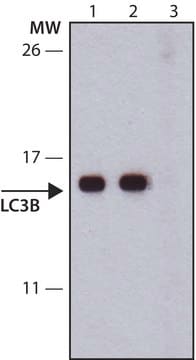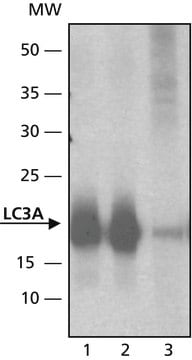SAB1305552
MONOCLONAL ANTI-LC3 (APG8) antibody produced in mouse
clone 166AT1234, IgG fraction of antiserum, buffered aqueous solution
Synonyme(s) :
Autophagy-related protein LC3 A, Autophagy-related ubiquitin-like modifier LC3 A, MAP1 light chain 3-like protein 1, MAP1LC3A, Microtubule-associated proteins 1A/1B light chain 3A
About This Item
Produits recommandés
Source biologique
mouse
Niveau de qualité
Forme d'anticorps
IgG fraction of antiserum
Type de produit anticorps
primary antibodies
Clone
166AT1234, monoclonal
Forme
buffered aqueous solution
Poids mol.
14272 Da
Espèces réactives
rat, mouse, human
Technique(s)
immunofluorescence: 1:25
immunohistochemistry: 1:50-1:100
western blot: 1:1000
Isotype
IgG1κ
Numéro d'accès NCBI
Numéro d'accès UniProt
Conditions d'expédition
wet ice
Température de stockage
−20°C
Modification post-traductionnelle de la cible
unmodified
Informations sur le gène
human ... MAP1LC3A(84557)
Forme physique
Clause de non-responsabilité
Not finding the right product?
Try our Outil de sélection de produits.
Code de la classe de stockage
10 - Combustible liquids
Point d'éclair (°F)
Not applicable
Point d'éclair (°C)
Not applicable
Certificats d'analyse (COA)
Recherchez un Certificats d'analyse (COA) en saisissant le numéro de lot du produit. Les numéros de lot figurent sur l'étiquette du produit après les mots "Lot" ou "Batch".
Déjà en possession de ce produit ?
Retrouvez la documentation relative aux produits que vous avez récemment achetés dans la Bibliothèque de documents.
Les clients ont également consulté
Notre équipe de scientifiques dispose d'une expérience dans tous les secteurs de la recherche, notamment en sciences de la vie, science des matériaux, synthèse chimique, chromatographie, analyse et dans de nombreux autres domaines..
Contacter notre Service technique














